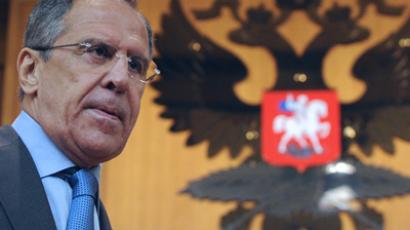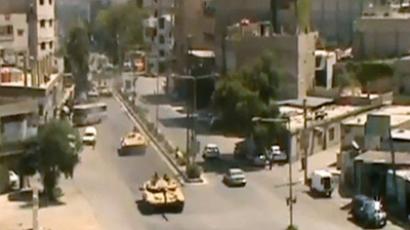Syria's top security ministers slain in Damascus bombing
Three key Syrian military officials including Defense Minister Gen. Daoud Rajha and President Bashar al-Assad’s brother-in-law Assef Shawkat, who served as his deputy, were killed at a top-level meeting in central Damascus.
The attack took place at the National Security building in the district of Rawda, where government ministers and a number of security officials had convened.Syrian General Hassan Turkmani – a former defense minister and senior military official – died from wounds sustained in the blast.A number of attendees received serious injuries, and some of them remain in critical condition.Another prominent governmental figure targeted by the attack is Syrian intelligence chief Hisham Bekhtyar. Bekhtyar is currently undergoing surgery for injuries sustained in the blast, a security source told Reuters.It has also been reported that Interior Minister Mohammad al-Shaar and Maher al-Assad, the president’s younger brother and the commander of the Syrian Army's elite Fourth Armored Division, were injured.The “confirmed” information the Free Syrian Army claims to have received suggests that he is most likely being treated by his personal medical team at the presidential palace or at a secret location.“We were able to hear the sound of this explosion and we have to admit that it was a very intense and massive blast,” RT’s Maria Finoshina reported from Damascus.She said the blast occurred in a traditionally safe and calm upscale neighborhood where many government buildings are located.“So of course security has been very tight, specifically in this area,” Finoshina told RT's Moscow bureau.The area around the national security building in the Rawda district has been cordoned off.
Islamist rebel group behind the attack
A Syrian rebel Islamist group, Liwa al-Islam, has claimed responsibility for the attack, saying in a statement on Facebook that it "targeted the cell called the crisis control room in the capital of Damascus."Liwa al-Islam spokesman Qassim Saadedine confirmed the information by phone.A rebel commander identified as Riyad al-Assad says the bomb was planted inside a room where senior government officials were meeting. However, he denied information suggesting that the deadly blast was a suicide bombing.The bomber who detonated the explosive reportedly worked as a bodyguard for President Assad’s inner circle, Reuters cites its sources as saying.The Free Syrian Army says it carried out the attack. FSA head Riyad al-Assad said he hoped it would be "the beginning of the end of the regime.""Hopefully Bashar will be next," he was quoted by AP as saying.The Syrian government put the blame for the "terrorist bomb attack" on "hired hands," and pledged to pursue the perpetrators and wipe out their "criminal gangs," state TV reported.
Foreign forces involved?
The attack was allegedly carried out by a former Assad agent, and in this case it is very dangerous situation where the regime is starting to be shaking and maybe even falling apart, Younes Abouyoub, a research scholar at Columbia University, told RT.But there is more than one version of the event, he added.“May be there is a larger intelligence operation involving foreign intelligence services,” he said. “First of all the timing of this work, the way it was carried out, the fact that it’s targeted three major figures within the regime – this shows that these are professionals, not amateurs. This is not someone who just did it by himself, or as they try to portray it, one suicide bomber acting on his own. This is not the act of one person or two, this is a very carefully planned and well-organized and implemented operation.”War correspondent Eric Margolis agrees that the operation was too well-prepared to be carried out by an amateur, because such a gathering of high-profile officials would normally have the toughest security, making it impossible for a single suicide bomber to infiltrate.“There may have been explosives hidden there before the meeting,” he said. “I have covered a lot of these kind of explosions and it seems to me that the damage done, or that’s being reported, has far exceeded the damage that can be caused by one man carrying a suicide vest.”
UN Syria resolution vote delayed
Damascus has already appointed a new defense minister, state TV reports. Gen. Fahad Jassim al-Freij, who was previously the chief of staff of the armed forces, will now assume the top cabinet post.The violence comes ahead of a UN Security Council session which is tasked with deciding whether to prolong an observer mission in Syria before it expires on July 20. All members agree that the mission should continue its work, but differ on the wording of the resolution which would allow it happen.However, following the killing of the Syrian officials, UN Security Council has postponed voting on an UN-backed Syria resolution until Thursday. It had been scheduled for a Wednesday vote.














